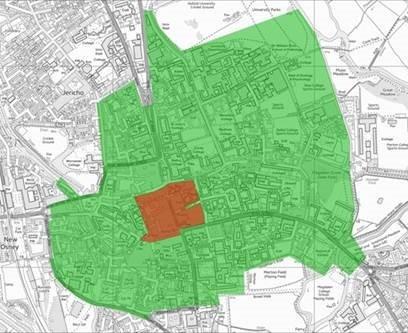BUS bosses and taxi drivers have welcomed Oxford’s new Zero Emission Zone plan, which waters down proposed regulations.
Under the revised scheme published this week, buses will be made to switch to low-emitting Euro 6 models by the end of next year and taxis licensed in Oxford will have to be zero emitting by 2025.
Previously, Oxford City Council had proposed banning all petrol and diesel vehicles from parts of the city centre from 2020.
READ AGAIN: Zero Emission Zone plans relaxed as 2020 driving ban dropped
Taxi and bus organisations, which heavily criticised the original plans, have welcomed the changes, though others have suggested the county and city councils backed down after lobbying.
Sajad Khan, secretary of the City of Oxford Licensed Taxicab Association (COLTA), said: “COLTA and the city council have engaged in direct, frequent, and productive discussions to make the ZEZ a workable reality which black cab drivers of Oxford can proudly help to achieve.
“It’s been a positive relationship with councillors and officers who have listened to drivers, and worked with us to make the transition.”
He continued: “This phased approach is much more reasonable than the initial plan as it gives drivers certainty and enables them to plan future vehicle purchases.”
READ AGAIN: Oxford's Zero Emission Zone plan – your questions answered
Mr Khan said that he wanted the Hackney Carriage fleet to become full electric ‘when possible’ and welcomed funding to install new electric charging points.
Steve Dawe, from the Cowley Area Transport group, said the delayed roll-out of the scheme was bad news for the environment.
He explained: “From a sustainability point of view, this decision is not good.

Above: A map of the new ZEZ proposal area
“The bus and taxi companies are opposing and delaying a ZEZ: I’m afraid we’re looking at a clash between vested interests and groups concerned by public health, air pollution and climate.
“The ZEZ plans already relate to an area that is currently pedestrianised, meaning little will be achieved unless it is made much larger.”
Other environmentalists have raised similar concerns.
READ AGAIN: ZEZ proposal changes divide campaigners
Mr Dawe added: “The news that we are going to wait until 2037 for a very small ZEZ is really, really unhelpful to the council on changing its policies on air pollution and climate change.”
Bus company representatives have taken a similar stance to COLTA.
Chris Coleman, managing director of Stagecoach in Oxfordshire, said: “Buses have a key role to play in boosting the region’s air quality, as well as addressing damaging congestion.
"The latest Euro 6 buses are cleaner than new Euro 6 cars and can carry up to 20 times more people.
“We look forward to working in partnership with the council to deliver an even better local environment and encourage more people to switch from the car to greener and smarter bus travel.”
Oxford Bus Company managing director Phil Southall echoed those views, saying delivery was still ‘challenging’ but now ‘more realistic’.
He said: “We still need to purchase further vehicles to deliver an Ultra-Low Emission Zone in late 2020 but we are confident that we can achieve this within the time frame.”







Comments: Our rules
We want our comments to be a lively and valuable part of our community - a place where readers can debate and engage with the most important local issues. The ability to comment on our stories is a privilege, not a right, however, and that privilege may be withdrawn if it is abused or misused.
Please report any comments that break our rules.
Read the rules hereLast Updated:
Report this comment Cancel